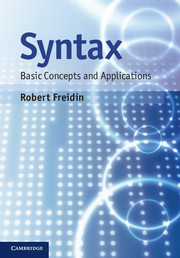Book contents
- Frontmatter
- Contents
- Preface
- Acknowledgements
- 1 The computational nature of human language
- 2 Knowledge of language as an object of inquiry
- 3 Categories and constituents
- 4 Phrase structure theory
- 5 The structure of clauses
- 6 The syntax of Spec-TP
- 7 Head movement and the structure of root clauses
- 8 Wh-movement
- 9 Ellipsis
- Notes
- Glossary
- References
- Index
3 - Categories and constituents
Published online by Cambridge University Press: 05 November 2012
- Frontmatter
- Contents
- Preface
- Acknowledgements
- 1 The computational nature of human language
- 2 Knowledge of language as an object of inquiry
- 3 Categories and constituents
- 4 Phrase structure theory
- 5 The structure of clauses
- 6 The syntax of Spec-TP
- 7 Head movement and the structure of root clauses
- 8 Wh-movement
- 9 Ellipsis
- Notes
- Glossary
- References
- Index
Summary
Syntactic knowledge
Returning now to knowledge of syntax, let us review some points our fish examples illustrate.
First, what is known about a sentence crucially concerns the syntactic function of each word in it. Consider (1):
(1) Fish fish
(1) has several possible interpretations, depending on what syntactic category is assigned to each word. In this example the same phonetic form [f I ʃ ] can represent a noun or a verb. If Fish in (1) is interpreted as a noun, then fish can be interpreted as a verb and the entire construction will be interpreted as a declarative sentence containing an intransitive verb (i.e. lacking an object). If however, Fish in (1) is interpreted as a verb, then fish can be interpreted as a noun and the entire construction will be interpreted as an imperative sentence, a command, with a covert second person subject (i.e. one that has an LF representation, but no PF representation).
Second, what is known about a sentence crucially concerns the way in which words join together to form syntactic units. Thus (2) has two possible sentential interpretations depending on how the five words join together as units.
Information
- Type
- Chapter
- Information
- SyntaxBasic Concepts and Applications, pp. 37 - 57Publisher: Cambridge University PressPrint publication year: 2012
